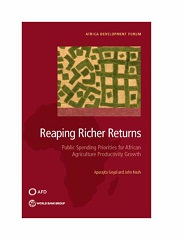Global strategic trends - Out to 2045
This fifth edition of Global Strategic Trends (GST 5) aims to describe possible futures to provide a strategic context for policy- and decision-makers across Government. Thirteen broad thematic areas have
This fifth edition of Global Strategic Trends (GST 5) aims to describe possible futures to provide a strategic context for policy- and decision-makers across Government. Thirteen broad thematic areas have
The population of the world, long expected to stabilize just above 9 billion in the middle of the century, will instead keep growing and may hit 10.1 billion by the year 2100, the United Nations projected in a report released Tuesday. Children at a community clinic in the village of Kanaja in Malawi on Sept. 7, 2009.
This latest Evidence on Demand report provides topical background information on how the rapid increase in land acquisition in Sub-Saharan Africa and Southeast Asia could impact water supplies. By looking
NEW DELHI: For India, the battle on Kyoto Protocol at the Durban climate talks beginning on Monday boils down to ensuring the global community does not impose an unjust tax on its energy and growth. At
As the latest round of United Nations climate negotiations began in Durban, South Africa, expectations could scarcely have been lower. A globally binding deal is further away than ever. That makes considerable
A new proposal from AOSIS Alternative to the Danish Proposal and the BASIC draft. The Association of Small Island States (AOSIS) released a new, overarching proposal for fulfilling the mandates of the Bali Action Plan, and setting legally binding targets for developed countries post-2012.
<p>At least 10 million people globally do not have citizenship of any country, according to the UN. Without nationality, stateless people cannot vote and can find it difficult or impossible to gain access to healthcare, education and employment.</p>
Coal and its emissions are a critical issue as the world contends with both the global energy crisis and the climate crisis. Coal in Net Zero Transitions: Strategies for rapid, secure and people-centred

This UNDP-WHO joint report draws attention to the global energy access situation and highlights that three billion people still rely on traditional biomass and coal, with a striking two million deaths per year associated with indoor burning of these solid fuels in unventilated kitchens.<br> Almost two billion people need modern energy services by 2015 to accelerate MDGs achievement.
Bolivia's attempt to win fresh support for the Kyoto Protocol is a step ahead in the efforts of the developing world to advance climate negotiations. Brazil, South Africa, India, and China have, as the BASIC countries, called for a legally binding, long-term cooperative agreement under the United Nations Framework Convention on Climate Change and the Kyoto Protocol.
Africa is the least electrified place in the world. An estimated 550 million Africans have no access to electricity. Nearly half of African countries have a power crisis. Solving this huge problem is made more difficult by widespread poverty, and because most Africans live far from the grid, greatly adding to the cost of bringing electricity to them.

This new report by Greenpeace International, European Solar Thermal Electricity Association (ESTELA) and IEA SolarPACES outlines how under an advanced industry development scenario, concentrating solar power, could meet up to 7% of the world

The summit suffered from a crisis of trust
<font face=arial size=3 color=#CE181E><b>•</b></font> Greenpeace's newest ship, <i>Esperanza</i> is out at sea. It will sail from the Azores to Antarctica, informing people on the way about the crisis faced by oceans. The expedition's primary focus is creating a global network of ocean parks, marine reserves. <br>
The paper analyzes the determinants of long-term individual and community resilience for food and nutrition security in South Sudan using data from multiple sources including key informant interviews,
China, Brazil and South Africa have joined India in rejecting a key OECD study stating that rich countries have already mobilised nearly two-thirds of the $100bn (£67bn) pledged to secure a new climate
New Delhi: The BASIC group of India, China, Brazil and South Africa have decided to recast the debate about
<p>This document contains the summary of the BASIC meeting of Climate Experts on equitable access to carbon space and issues related to trade policy and climate change, at Tianjin during 9-10 Oct.2010.
While world environmental risk analysts have expressed fears over extreme climate changes in South Asian nations including Sri Lanka, U.N. climate panel chairman said the world could still cap global warming at far lower levels than widely expected if nations

Enhancing the productivity of agriculture is vital for Sub-Saharan Africa's economic future and is one of the most important tools to end extreme poverty and boost shared prosperity in the region. How